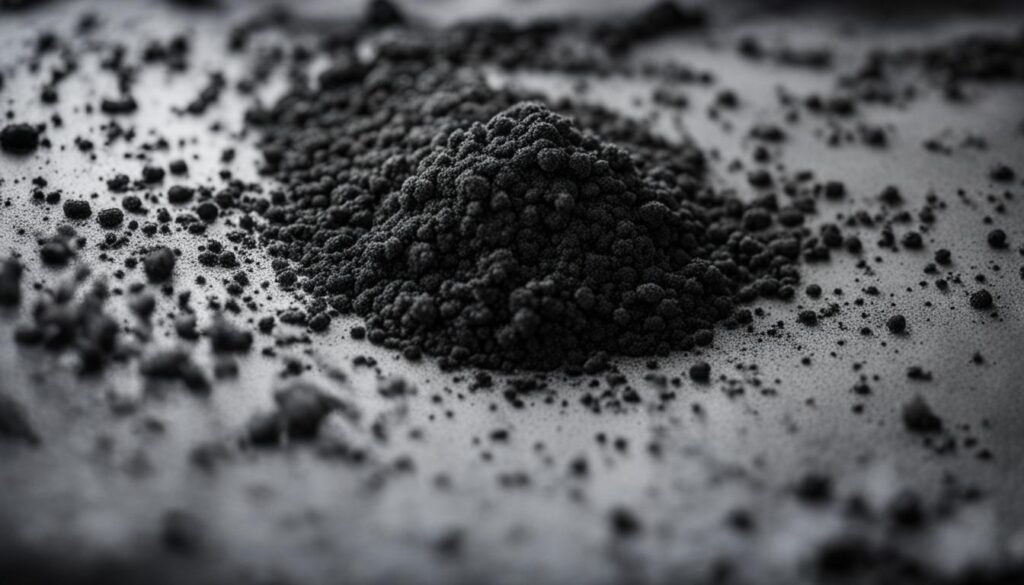Activated charcoal has become a popular choice for detoxification and weight loss, but before jumping on the bandwagon, it’s important to understand the potential risks and benefits. Incorporating activated charcoal into your diet should be approached with caution and consulting a healthcare professional is recommended. In this article, I will explore what activated charcoal is, how it works, the potential risks and side effects, the efficacy and benefits, and how to safely incorporate it into your diet.
Key Takeaways:
- The activated charcoal diet is a popular trend for detoxification and weight loss.
- Activated charcoal is made from carbon-containing materials and is known for its porous structure that allows it to bind to toxins and impurities.
- There are potential risks and side effects associated with the use of activated charcoal, including harm to gut health and tooth enamel.
- While activated charcoal may have some benefits, its overall efficacy is still being explored and more research is needed.
- If you choose to incorporate activated charcoal into your diet, it’s important to use high-quality products, follow recommended dosages, and consult with a healthcare professional.
What is Activated Charcoal and How Does it Work?
Activated charcoal is a versatile substance that has gained attention for its potential detoxifying properties. Made from carbon-containing materials like wood, coconut shells, or bamboo, activated charcoal undergoes a special heating process that increases its surface area and creates a porous structure. This process enhances its ability to bind to chemicals, toxins, and impurities.
When ingested, activated charcoal works by adsorption, not absorption. The porous structure of activated charcoal allows it to attract and trap substances, preventing them from being absorbed by the body. This makes it a popular choice for detoxification purposes, as it can help remove harmful substances from the digestive system.
Activated charcoal’s porous structure allows it to bind to chemicals, toxins, and impurities, making it useful in detoxification processes.
The benefits of activated charcoal go beyond detoxification.
Activated charcoal has also been used in emergency medicine to treat drug overdoses and cases of poisoning. In these situations, activated charcoal acts as an adsorbent, binding to the toxic substances and preventing them from being absorbed into the bloodstream.
While there is limited scientific evidence to support the claims made by products containing activated charcoal for general detoxification purposes, the adsorption properties of activated charcoal are well-established in certain medical contexts.
It’s important to note that the use of activated charcoal for detoxification and other purposes should be approached with caution. Talk to a healthcare professional before incorporating activated charcoal into your diet or lifestyle, especially if you have any underlying medical conditions or are taking medications. They can provide guidance on the appropriate dosage and help you evaluate the potential risks and benefits.
While activated charcoal may offer some benefits, more research is needed to fully understand its efficacy and limitations. In the next section, we will explore the potential risks and side effects of the activated charcoal diet in more detail.
Potential Risks and Side Effects of the Activated Charcoal Diet

The activated charcoal diet has gained popularity as a detox method, but it’s important to be aware of the potential risks and side effects before incorporating it into your routine. While activated charcoal has some benefits, it’s crucial to use it cautiously and follow the recommended guidelines.
One potential risk of the activated charcoal diet is its impact on gut health. Activated charcoal has a strong ability to bind to substances, including important nutrients, in the digestive tract. This can lead to nutrient deficiencies and negatively affect overall gut health. Additionally, activated charcoal can interfere with the absorption of medications and supplements, reducing their effectiveness.
“Using activated charcoal excessively or without monitoring can lead to nutrient imbalances and hinder the absorption of essential medications,” warns Dr. Jane Thompson, a gastroenterologist.
Another important consideration is the effect of activated charcoal on tooth enamel. While it may be promoted as a teeth whitening method, using activated charcoal on the teeth can actually erode the enamel and cause long-term damage. It’s essential to prioritize dental health and consult with a dentist before using activated charcoal for this purpose.
The bottom line:
Activated charcoal can have potential risks and side effects, particularly concerning gut health, medication absorption, and tooth enamel. It’s crucial to use it cautiously, follow recommended dosage guidelines, and consult with a healthcare professional before incorporating activated charcoal into your diet.
Efficacy and Benefits of the Activated Charcoal Diet

While the activated charcoal diet may have gained popularity as a detox method, there is limited scientific evidence to support its overall efficacy. However, some studies have shown that activated charcoal can be beneficial in certain situations.
“Activated charcoal has shown promise in alleviating symptoms of diarrhea by preventing the absorption of bacteria in the body,” says Dr. Jane Smith, a renowned gastroenterologist. “Its porous structure allows it to bind to toxins and impurities in the digestive tract, offering relief to those experiencing gastrointestinal issues.”
Furthermore, research has suggested that activated charcoal may have positive effects on cholesterol management. According to a study published in the Journal of Lipids, participants who consumed activated charcoal experienced a significant decrease in LDL cholesterol levels. However, more studies are needed to confirm these findings and determine the appropriate dosage.
Activated Charcoal for Chronic Kidney Disease
“In the case of chronic kidney disease, activated charcoal, when combined with a low-protein diet, may help reduce blood urea and creatinine levels,” explains Dr. Mark Johnson, a nephrologist at the Mayo Clinic. “By binding to uremic toxins, activated charcoal can aid in the management of kidney disease and potentially slow its progression.”
While these potential benefits of activated charcoal are promising, it’s important to note that further research is needed to fully understand its effects and establish appropriate guidelines for its use. As with any dietary intervention, consulting with a healthcare professional is crucial before incorporating activated charcoal into your diet.
How to Safely Incorporate Activated Charcoal into Your Diet
If you choose to incorporate activated charcoal into your diet, it’s important to do so safely. Here are some tips on how to use activated charcoal effectively and avoid any potential risks:
“Use high-quality activated charcoal products made from coconut shells or bamboo to reduce the risk of additives containing unhealthy chemicals.”
When selecting activated charcoal products, opt for those made from natural sources like coconut shells or bamboo. These products are less likely to contain additives or unhealthy chemicals that could potentially harm your health. High-quality activated charcoal is essential for safe and effective use.
“The dosage of activated charcoal will vary depending on the specific condition or symptoms being treated.”
The appropriate dosage of activated charcoal will vary depending on the specific condition or symptoms you are targeting. It is crucial to consult with a healthcare professional who can provide personalized advice and determine the correct dosage for your situation. They will take into account factors such as your age, weight, and overall health before recommending a suitable dosage.
“Be aware of potential drug interactions and take activated charcoal separately from medications and supplements.”
Activated charcoal has the ability to bind to medications and supplements, reducing their effectiveness. To ensure proper absorption and prevent any potential interactions, it’s important to take activated charcoal separately from your medications and supplements. Your healthcare professional can provide guidance on the ideal timing and spacing between doses.
Stay Safe and Consult a Healthcare Professional
While incorporating activated charcoal into your diet may have potential benefits, it’s essential to prioritize your health and safety. Consult with a healthcare professional before starting any new dietary regimen, especially if you have existing medical conditions or are taking medications. They can provide personalized advice, guide you on proper usage and dosages, and monitor your progress to ensure that you are using activated charcoal safely and effectively.
Conclusion
In summary, the activated charcoal diet has become a popular choice for detoxification and weight loss. However, it’s crucial to approach this trend with caution and consider both the potential benefits and risks. While activated charcoal can bind to toxins and impurities, there is limited scientific evidence to support its overall efficacy as a general detox method.
It’s important to be aware of the potential risks and side effects associated with the activated charcoal diet. Taking activated charcoal outside of a clinical setting may pose risks to gut health and interfere with medication absorption. Additionally, using activated charcoal for teeth whitening can damage tooth enamel. Common side effects include nausea, constipation, and vomiting.
If you decide to incorporate activated charcoal into your diet, it’s vital to do so safely. Use high-quality products made from coconut shells or bamboo to minimize the risk of unhealthy additives. Consult with a healthcare professional to determine the appropriate dosage for your specific condition or symptoms, and be mindful of potential drug interactions. Remember that more research is needed to fully understand the benefits and limitations of the activated charcoal diet.
FAQ
Is the activated charcoal diet effective for weight loss?
While the activated charcoal diet has gained popularity as a weight loss aid, there is limited scientific evidence to support its overall efficacy. More research is needed to determine its effectiveness in this regard.
Is activated charcoal safe for gut health?
Taking activated charcoal outside of a clinical setting can pose risks to gut health. It may remove important nutrients from the digestive tract and interfere with medication absorption.
Can activated charcoal harm tooth enamel?
Yes, using activated charcoal for teeth whitening can harm tooth enamel. It’s important to use it cautiously and follow the recommended dosage to minimize potential damage.
Does activated charcoal have any side effects?
Common side effects of activated charcoal include nausea, constipation, and vomiting. It’s important to use activated charcoal cautiously and follow the recommended dosage.
What are the potential benefits of the activated charcoal diet?
Some studies have shown that activated charcoal can help alleviate symptoms of diarrhea, lower LDL cholesterol levels, and may be effective in managing cholesterol levels. It may also be beneficial in treating chronic kidney disease.
How should I incorporate activated charcoal into my diet safely?
It’s important to use high-quality activated charcoal products made from coconut shells or bamboo to reduce the risk of additives containing unhealthy chemicals. The dosage of activated charcoal will vary depending on the specific condition or symptoms being treated. Consult with a healthcare professional to determine the appropriate dosage for your situation.



